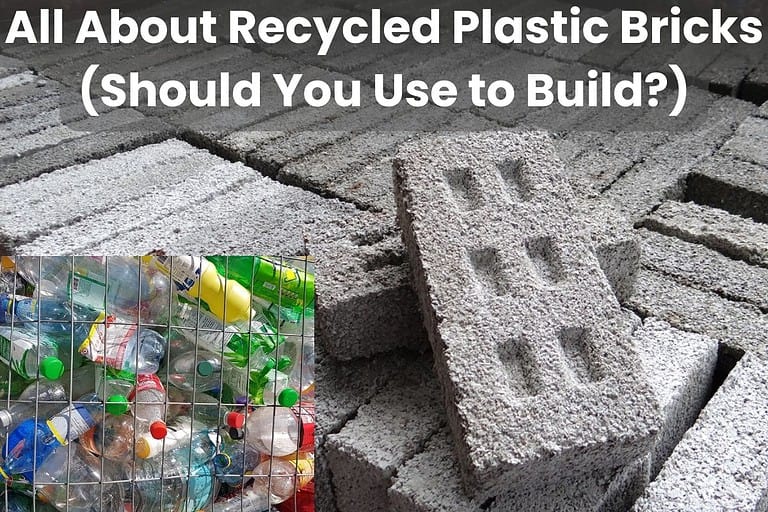Reclaimed Wood Countertops That Add a Touch of Kitchen Style
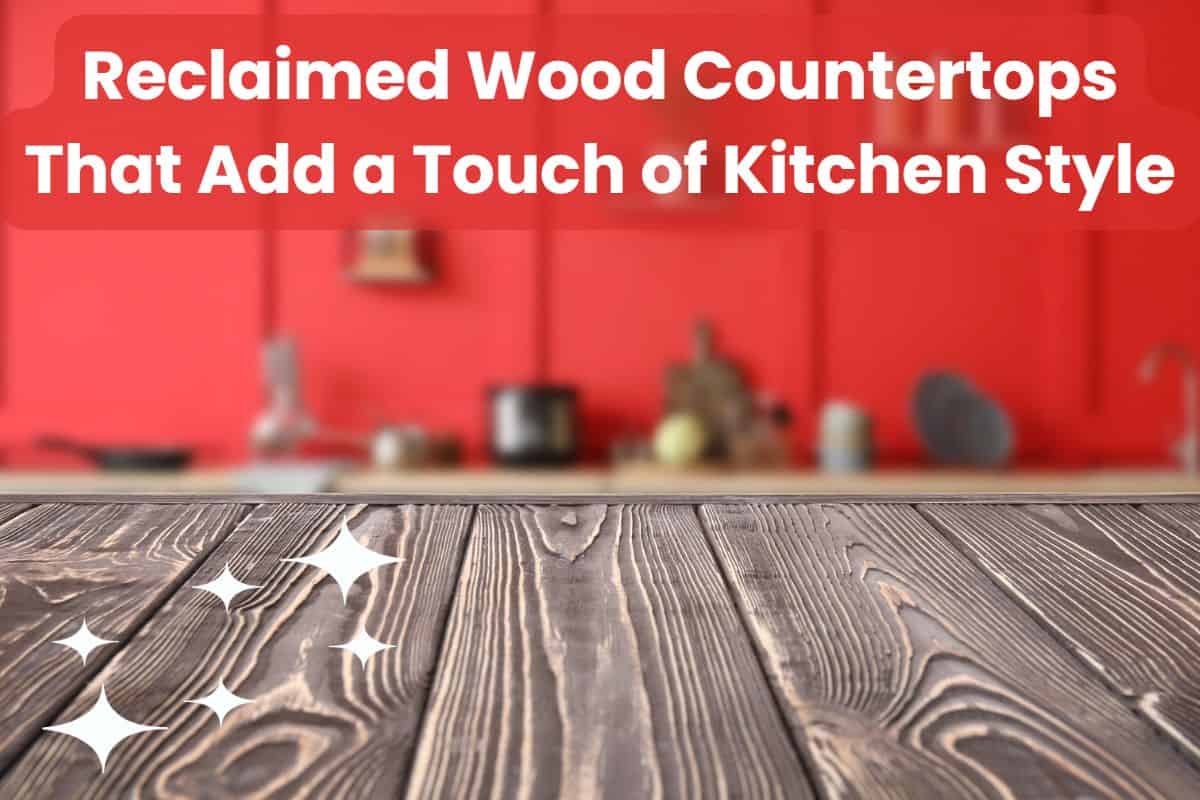
If you want to spruce up your kitchen and add some serious style points, look no further than reclaimed wood countertops.
These beauties not only add a rustic and cozy feel to your cooking space, but they’re also eco-friendly and can last for years.
Let’s face it; wood and water are not the best of friends. Unfortunately, kitchen countertops are exposed to moisture and food particles daily. This means not every reclaimed timber is suitable for kitchen countertops – you need wood that’s highly resistant to moisture and contact with food for a durable kitchen countertop.
In the rest of this article, I’ll discuss the best types of reclaimed wood for kitchen countertops, including their pros and cons.
I’ll also discuss where to buy this wood and how to maintain your countertops. Let’s get started!
1. Teak

Teak is a tropical hardwood suitable for kitchen countertops.
Like other hardwoods, teakwood offers excellent resistance to water due to its tightly packed fibers that minimize water absorption.
Moreover, teakwood’s naturally high oil content boosts its ability to resist moisture.
Besides its water resistivity, teak wood features a rich, warm color, making it a stylish kitchen addition.
Pros
- Aesthetically pleasing.
- High moisture resistance.
- Strong and highly durable.
- Resistance to termites.
Cons
- It’s expensive.
- Limited availability.
- It’s hard to get high-quality reclaimed teak wood.
2. Hard Maple
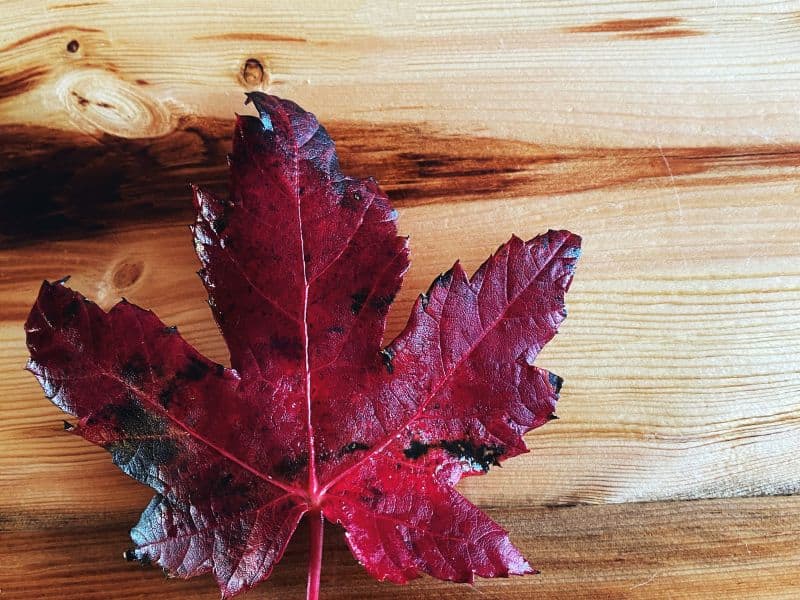
With its straight grain pattern and tightly packed fibers, hard maple is an excellent choice for kitchen countertops.
It’s very sturdy and can withstand the wear and tear of a busy kitchen without getting damaged. This explains why it’s common in butcher’s block countertops.
The tight grain pattern in hard maple makes it highly resistant to moisture absorption.
Pros
- High moisture resistance.
- Great aesthetic appeal.
- Strong and durable.
Cons
- Expensive.
- It’s cumbersome and difficult to work with.
3. Black Walnut

Reclaimed black walnut is a household name in kitchen décor for a good reason; the wood is tough and features a beautiful grain pattern.
The wood’s hardness and medium durability explain its strong water-resistant nature.
Moreover, its honey cream to brown hues adds an elegant touch to any kitchen.
Pros
- Beautiful grain pattern.
- Highly water-resistant.
- Elegant and stylish look.
Cons
- Expensive.
- Time-consuming to install.
4. White Oak
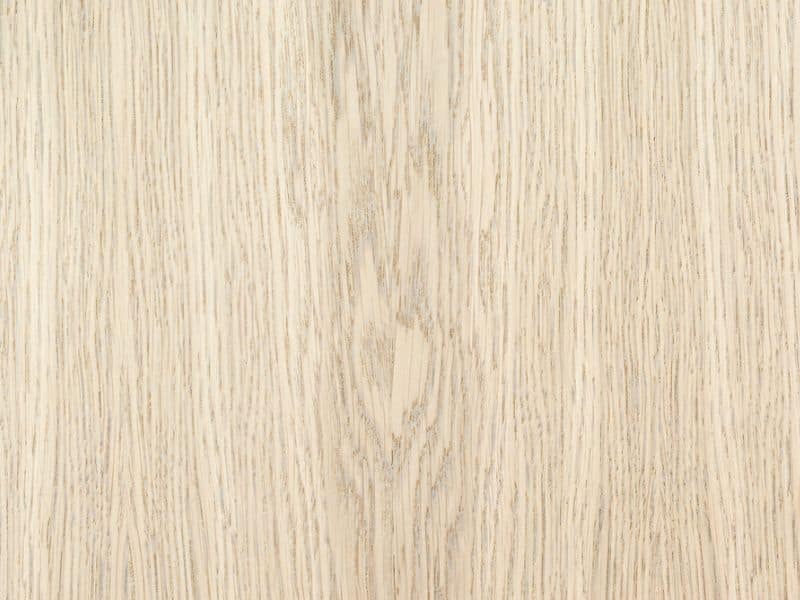
With a Janka hardness score of 1,350, reclaimed white oak is one of the toughest woods available.
This makes it an ideal choice for kitchen countertops as it can withstand constant exposure to water and other particles without degrading or warping.
What’s more, white oak can be refinished several times; therefore, there is no need to replace it even when it gets burned or scratched.
Pros
- Highly resistant to moisture.
- Beautiful grain pattern.
- Highly resistant to wear and tear.
- Stains and polishes well.
- Ideal for liming.
Cons
- Expensive.
- It’s cumbersome and difficult to work with.
5. Heart Pine
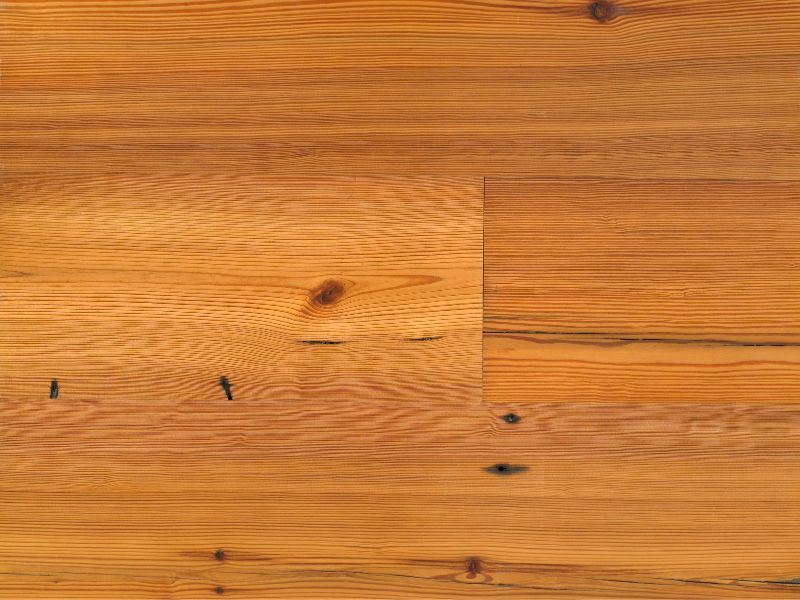
Reclaimed heart pine lumber is heavy, dense, and rot and insect-resistant. These features make it highly durable and sturdy.
Moreover, its tight growth ring pattern makes it ideal for places with high exposure to moisture, like kitchen countertops.
The wood also has a unique look, thanks to the richer and darker hue that results from aging and oxidation. It’s an attractive choice for kitchen countertops.
Pros
- Excellent water resistance.
- Sturdy and durable..
- Unique rustic appearance.
Cons
- It’s costly due to the high demand and the repurposing process.
- Limited availability.
6. TigerWood

Unsurprisingly, reclaimed tigerwood lumber is a popular choice for kitchen countertops.
The wood’s rich reddish-orange exotic stripes, coupled with the added texture and character due to aging, are ideal for aesthetically pleasing kitchen countertops.
Tigerwood has a high density of 930 kg/m3, making it highly resistant to water, rot, and bugs. Moreover, the wood has natural oils that repel moisture.
Pros
- Highly moisture resistant.
- Attractive exotic look.
- Easy to work with.
Cons
- Prone to wear out along the cutting edges.
- Susceptible to cracking if not handled with care.
- Requires sealing for increased durability.
7. Zebrawood
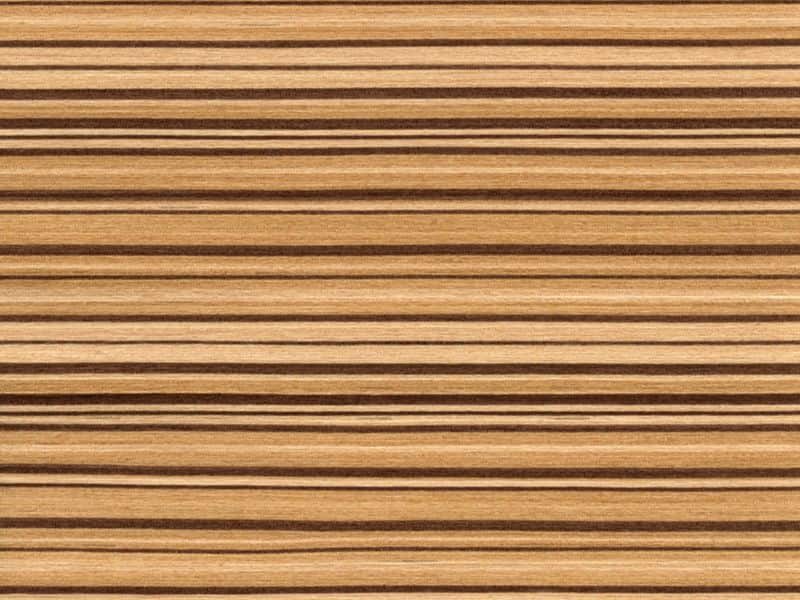
This is the true definition of decorative reclaimed wood.
Aptly named for its striking stripes, it is an ideal choice for reclaimed wood countertops due to its narrow dark brown to black streaks that create a unique appearance.
The wood’s best characteristic is its resilience because it stands up against almost anything you throw at it.
Pros
- Attractive striking stripes.
- Rot and decay resistance.
- Easy to work with.
Cons
- Expensive due to its high demand and limited availability.
- Requires sealing because it’s not highly moisture-resistant.
- Poor workability due to the prevalence of interlocking grains.
8. Douglas Fir
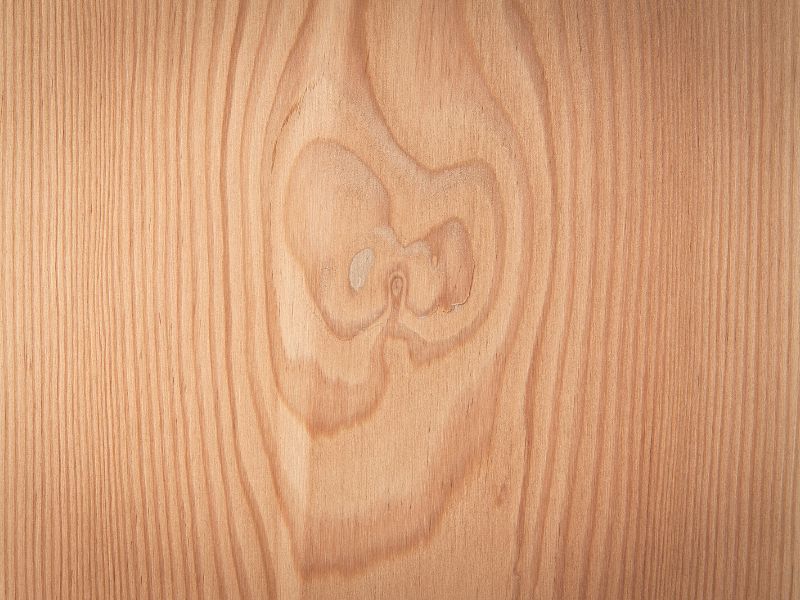
Contrary to popular belief, reclaimed Douglas fir makes one of the strongest woods for kitchen countertops.
Douglas fir grows tall and straight, thereby developing longer and straighter fibers. These fibers make its wood stronger and highly resistant to physical impacts.
Since Douglas fir is a refractory species, it’s highly resistant to wetting.
Pros
- Resistant to moisture, fungi, and insects.
- Easy to work with due to its high strength-to-weight ratio.
Cons
- Difficult to find due to scarcity of large Douglas fir trees in the market.
- As a softwood, it can be marred, dented, and scratched easily.
9. Hickory
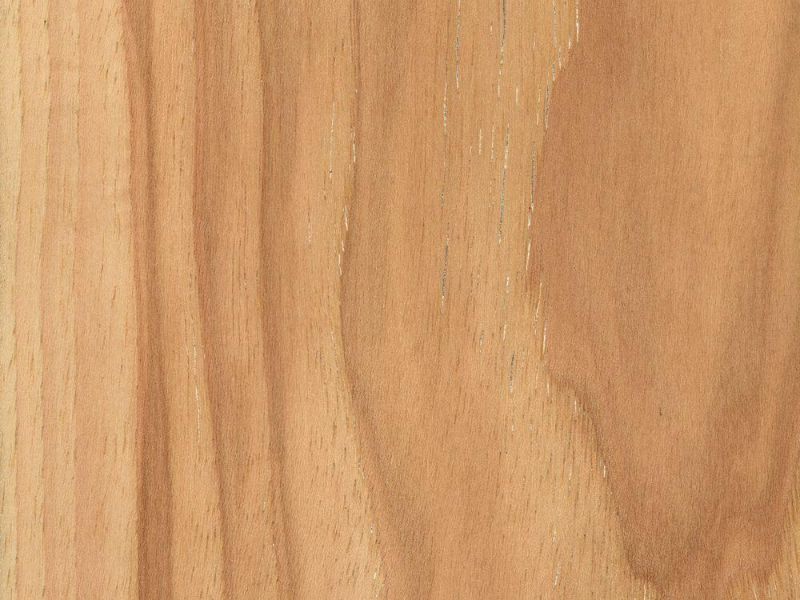
Reclaimed hickory makes one of the best barn wood countertops due to its dense, stiff, and shock-resistant nature.
Besides hardiness, hickory is aesthetically pleasing due to its significantly darker hues. These hues create a stunning visual ideal for an eye-popping contrast for reclaimed wood kitchen countertops.
Pros
- Highly shock-resistant.
- Easy to work with due to the presence of straight and long grains.
- Unique color variations.
Cons
- It’s expensive.
- Highly susceptible to swelling.
- Challenging to work with due to its hardness.
- It requires regular maintenance because it lacks natural oils that make other wood species more resistant to water damage.
The table below shows the Janka hardness rating of the above types of reclaimed wood suitable for kitchen countertops in descending order:
| Wood Type | Janka Rating |
| Tigerwood | 2,160 |
| Zebrawood | 1,830 |
| Hickory | 1,820 |
| Hard Maple | 1,450 |
| White Oak | 1,360 |
| Heart Pine | 1,225 |
| Teak Wood | 1,155 |
| Black Walnut | 1,010 |
| Douglas Fir | 660 |
Table 1: Janka hardness rating of the best reclaimed wood for countertops
What Is the Cost of Reclaimed Wood Countertops?
The cost of reclaimed wood countertops ranges from $30 to more than $140 per square foot. The cost varies based on wood species, the plank’s width, thickness, and the project’s complexity.
Salvaged wood countertops are more expensive than their virgin lumber counterparts due in part to the tedious salvaging process and the high demand.
Furthermore, the limited availability of reclaimed wood makes it costly. Therefore, you might have to consider an alternative if you’re on a tight budget.
It’s worth mentioning that reclaimed wood countertops with epoxy generally cost more than those without epoxy due to the high cost of the epoxy resin used in the process and the additional labor involved.
Reclaimed wood countertops DIY projects are also relatively expensive because you must purchase tools, adhesives, and other supplies. However, the cost is much lower compared to professional installations.
Where to Buy Reclaimed Wood Countertops

Having read to this point, you know the best reclaimed wood for countertops. But the question remains – where can you buy these pieces of lumber for high-quality kitchen countertops?
Luckily, there are many dealers and stores that specialize in reclaimed wood countertops. They include:
- Etsy: This is a marketplace that facilitates consumer-to-consumer selling of vintage items. Etsy is a great place to get reclaimed wood countertops at attractive prices by connecting buyers and crafters.
- Lowe’s: As a large retail company, Lowe’s provides a unique shopping experience by stocking reclaimed wood countertops of different sizes and shapes. You can get anything from rustic to finished options that match your taste.
- Lily Ann Cabinets: It’s among the leading companies in the distribution of kitchen and bathroom cabinetry in the U.S. It features different finishes and wood.
- Bath + Kitchen: It provides cabinetry design services and shipment.
- Elmwood Reclaimed Timber: This is your go-to company for custom kitchen counters and dining table tops made from salvaged wood.
How to Maintain Reclaimed Wood Countertops
Like any other wood, reclaimed wood countertops require regular maintenance to ensure they last longer without wearing out prematurely.
The following are tips to help you maintain your reclaimed wood countertop:
Clean Spills Immediately
Coffee, red wine, tea, and other acidic or colored liquids can discolor your reclaimed wood countertop if not wiped up right away. Therefore, you must act instantly to prevent permanent damage to the surface of your kitchen counters.
However, never use ammonia or bleach to wipe away spills; these products can discolor the wood.
Dish soap and hydrogen peroxide are the best options.
Use Coasters, Mats, and Trivets
You must use coasters to protect your reclaimed wood countertops from water rings and heat damage.
Mats and trivets are ideal for placing hot items such as pots, pans, dishes, and utensils on the surface of your kitchen counter to prevent heat damage.
Use Cutting Boards
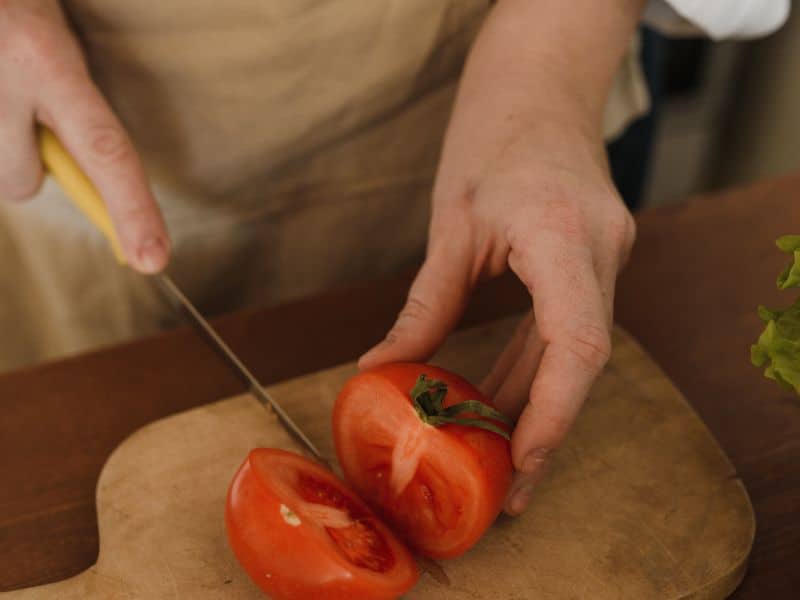
It’s also important to use cutting boards when chopping or slicing fruits, vegetables, and other foods in the kitchen.
Knife blades can easily scratch your reclaimed wood countertop if it’s left unprotected.
Polish Your Countertops Regularly
Polishing helps keep your reclaimed wood kitchen countertops looking beautiful. It adds a protective layer against scratches, dents, and spills.
You can use mineral oil or furniture wax to polish the wood and protect it from moisture.
It’s also recommended to sand the surface with 120 and 180-grit sandpaper and apply a fresh finish coat annually. This helps restore the original shine and luster of your reclaimed wood countertops.
With the right care and maintenance, reclaimed wood countertops are highly durable and can last a lifetime.
Reclaimed Wood Countertops Pros and Cons
Pros
- They are highly durable.
- Are aesthetically pleasing.
- Are eco-friendly and sustainable.
- Are highly resistant to moisture.
Cons
- They are more expensive than virgin lumber.
- They require regular maintenance to remain in top shape.
- Hygiene concerns due to the possibility of pests and contaminants from previous uses.
Final Thoughts
Reclaimed wood countertops are a fantastic addition to any kitchen. Whether you’re a fan of farmhouse chic or modern minimalism, there’s a reclaimed wood countertop out there that’s perfect for you.
Besides providing a warm and rustic feel, reclaimed wood countertops are sustainable and help conserve the environment.
Before you leave, here is a list of the 10 most non-toxic materials to build with that you might enjoy.



